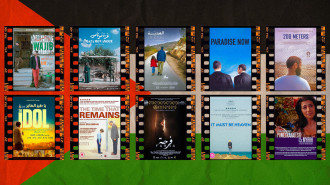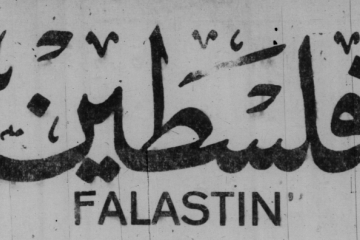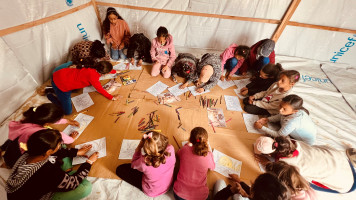
Israel's blockade has plunged Gaza's fishermen into a net of misery

Israeli bombs rain down on Gaza once more. The surprise, unprecedented attack by Hamas's Al-Qassam Brigades has been met with indiscriminate Israeli aggression, forcing everyone in the besieged enclave to seek shelter whilst awaiting their fate.
At the time of writing, the Israeli Defence Minister, Yoav Gollant, has ordered a "complete siege" of the Gaza strip: "no electricity, no food, no fuel, everything is closed."
In many ways, however, this is just a more explicit extension of the daily realities Gazans have faced over the last 16 years under Israeli blockade, with Gaza's fishermen are public enemy number one.
"They kept firing at us with rubber-coated steel bullets. Two Israeli commandos jumped aboard and screamed at us whilst continuing to shoot. I was hit with 23 bullets. They beat me. My jaw and neck were broken and bleeding"
Israel continues its arbitrary and stifling policies against Gaza's fishermen, resorting to deliberately punitive policies to destroy the second most productive economic sector in the Gaza Strip.
The main commercial crossing in Gaza - "Kerem Shalom" - was recently closed by Israel for four days on Monday, September 4th. According to Gaza's fishermen union, the decision caused the rotting of 26 tonnes of fish and $300,000 in losses.
Mahmoud Alsaidi, a thirty-one-year-old fisherman from Gaza, suffers from life-altering injuries after being attacked by Israeli forces at sea. Before his injuries, every night, he would kiss his children goodnight before heading out to sea to earn his keep. On the night of 13 January 2016, Mahmoud and his brother, Mohammed, were nine and a half miles out at sea.
Israel restricts the fishing border in Gaza to just six miles and is patrolled by Israeli ships and naval commandos who injure and kill anyone who crosses the border. This is in flagrant violation of the Oslo Accords - signed between Israel and the PLO in the 1990s - that grants Gaza's fishermen to venture up to 20 nautical miles from the shore to fish.
"It's impossible to catch enough fish within the permitted zone," Mahmoud explained to The New Arab. "We're forced to go further to increase our chances of providing for our family."
"At dawn on the 14th of January, we were beginning to reel in our fish to return home. Without warning, the Israeli navy started shooting at us," Mahmoud said with anguish. "They said they wanted to disable our boat's engine and detain us. If they detain us, we'd be likely sentenced to at least 5 years in prison. I clung to the engine, I couldn't afford to lose it. Boat engines are a luxury in Gaza.
"They kept firing at us with rubber-coated steel bullets. Two Israeli commandos jumped aboard and screamed at us whilst continuing to shoot. I was hit with 23 bullets. They beat me. My jaw and neck were broken and bleeding," Mahmoud told The New Arab.
Mahmoud spent 18 days in the ICU; he lost his larynx and severed vocal cords. He now relies on a plastic tube in his throat for communication and sustenance. He can no longer eat more than one piece of bread and two litres of water per day. All he wants is to be a normal person: "All I want is to enjoy a meal without constantly struggling to swallow. I wish to eat more two pieces of bread instead of one. But if I try, the food will come back up through my nose."
Israel detained Mahmoud a second time at sea in September 2016, confiscated his boat and imprisoned him for four years. Now Mahmoud is burdened with debt and is now without a boat and livelihood.
According to a report from the Euro-Med Human Rights Monitor, "the number of registered fishermen in Gaza has fallen from 10,000 to 4,000 since 2000 as a result of Israeli restrictions and blockade." Maha Hussaini, strategy director at Euro-Med Human Rights Monitor, explained to The New Arab that "Israel clearly violates international law with its continuous attacks on fishermen as an occupying power."
She continued by saying "The Oslo Accords, which Israel signed, allows Palestinians to sail up to 20 nautical miles. In reality, this rarely happens. In the best-case scenario, Palestinians are allowed to sail up to six or nine nautical miles. Most of the time, the distance is reduced to three or four miles. Even when fishermen attempt to fish within permitted areas, they are subjected to attacks and gunfire, Maha revealed to The New Arab.
"The severe restrictions are part of the Israeli blockade and Israeli authorities often use the livelihoods of fishermen and farmers as leverage as a tool of collective punishment against Palestinians."
|
Struggle to live
On 1 November 2022, at 2:00 AM, Abdelrahman Abu Ryala, 19, and five other fishermen were 10 miles from the shore near a 12-mile fishing zone. Suddenly, Israeli gunboats showed up and started shooting at them.
Four boats got away, but Abdelrahman and one other boat weren't so lucky. They were arrested, their boats were taken, and their GPS devices were confiscated. “The Israeli gunboats began shooting at the engine of your boat to disable us,” Abdelrahman said. "Whilst working for our families, the Israeli authorities tried to kill me like they had my father," Abdelrahman said. Abdelrahman's father, Tawfiq, was killed by Israel while fishing in 2015.
Abdelrahman and three other fishermen were arrested and imprisoned in Ashdod port for ten hours. Their hands and legs were forcefully shackled until release. After ten gruelling hours, they were released. But Abdelrahman found himself without a boat, without income, and burdened with debts exceeding $3,000 due to the lack of fishing opportunities.
Desperate to support his family, he was left with no choice but to work as a hired hand for others. "You are trying to earn a living for your younger brothers with 20 shekels ($5). Israel disables and confiscates your boat, which costs $9,000. In Gaza, we are struggling to live," Abdelrahman said.
Abdelrahman was forced to leave school at just 11 years old; he became the sole breadwinner for his family, consisting of his mother and 4, after his father's murder. Abdelrahman's struggle is like that of many Gaza fishermen, who lack international support or human rights organisations. Despite his difficulties, he dreams of owning another boat to improve his family's life.
Nizar Ayyash, head of Gaza’s fishermen union, told The New Arab that “95% of the fishermen in the Gaza Strip are below the poverty line.” Nizar anticipates that over 70% of fishermen will stop working during the next year due to mechanical breakdowns on their boats, Israeli restrictions on entry of necessary equipment, and a ban on the export of fish.
“Fishermen's boat machines have been banned from entering Gaza for 16 years, the lifespan for machines is 5-7 years,” Nizar said. Israel has banned fishing equipment from entering Gaza since 2007. Basic necessities such as fishing nets, GPS devices, boat engines, and the simplest fishing tools are banned."
Mahmoud Mushtaha is a Gaza-based freelance journalist and human rights activist. He works as a media assistant at We Are Not Numbers, a project of the Euro-Med Human Rights Monitor.
Follow him on Twitter: @MushtahaW
Hadi Wadi is a Gaza-based freelance journalist.
![Due to the violent Israeli blockade, the number of fishermen in Gaza has dwindled [Getty]](/sites/default/files/styles/medium_16_9/public/2023-10/GettyImages-1233430676%20%281%29.jpg?h=199d8c1f&itok=HwJJNtTU)


